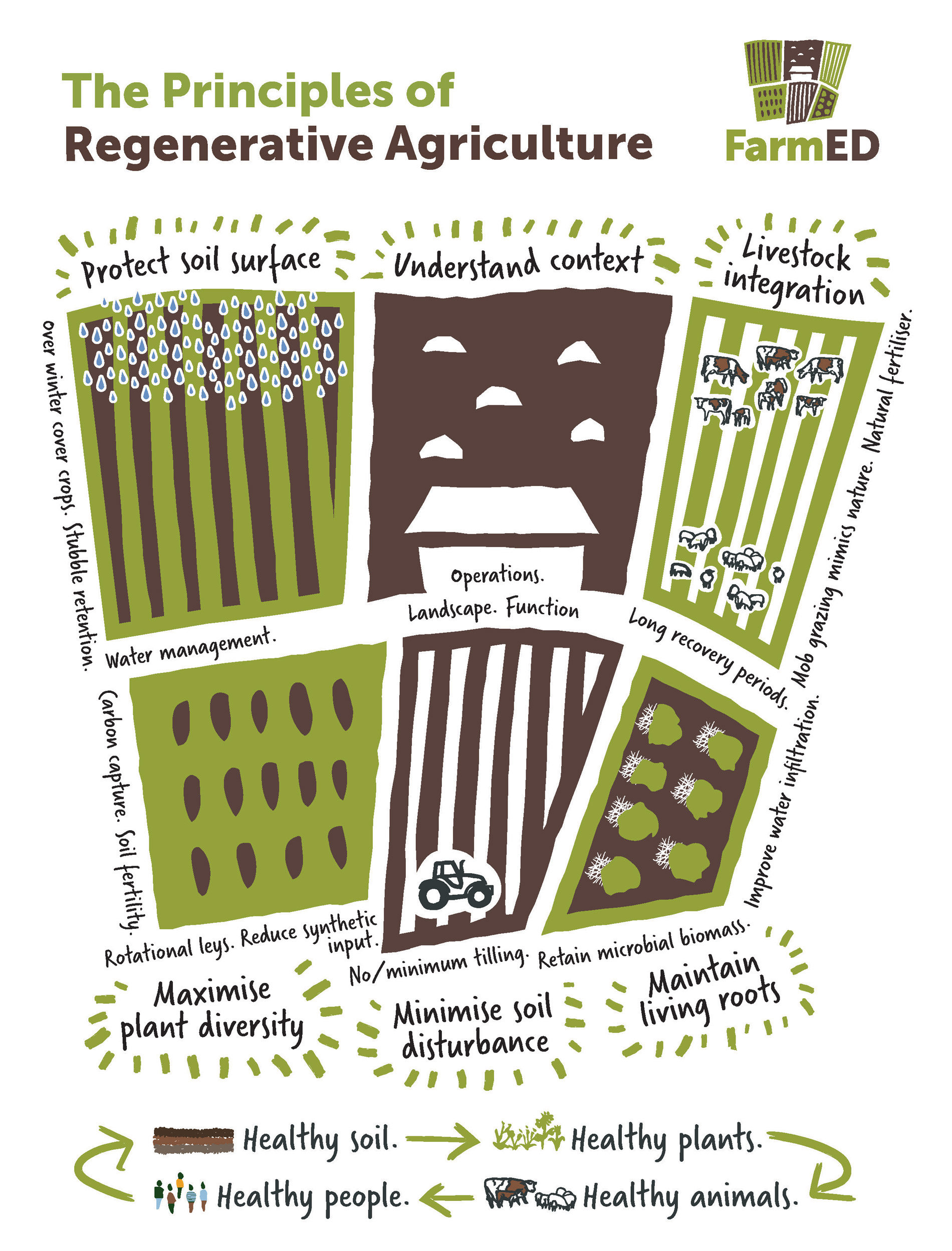What is regenerative agriculture?
Regenerative agriculture is a term used to describe farming methods that aim to restore and improve the health and fertility of the soil, increase biodiversity and enhance ecosystems, ensure livestock welfare and strengthen communities.
Though the term ‘Regen Ag’ is relatively new, the system is not. The mixed farming practices actually reflect the way we used to farm before monoculture cropping and high-input fertilisers and chemicals were introduced in response to the pressing need to increase yields to feed the country after WWII.
We’re now gravely aware of the devastating impact this has had in the long term, most significantly to the health and structure of the soil which is the key to sustainable food production and mitigating climate change across the globe.
Sustaining and conserving is no longer enough when it comes to farming. We need to undo the damage that’s been done. We need to restore and regenerate soil health. The good news is that we can do it!

The principles of regenerative agriculture explained.
Protect the surface of the soil
Disturbance can be either mechanical (ploughing or cultivating) or chemical (applying synthetic fertilisers or pesticides). Disturbing the soil on a regular basis has significant consequences, including soil erosion, nutrient depletion, the breakdown of symbiotic relationships and the release of carbon into the atmosphere. These actions destroy the organic structures that hold carbon in the earth. To mitigate these effects, adopting no till or minimum till practices and reducing chemical applications is crucial in helping soil retain its microbial diversity, improving soil health overall.
Understand the context of your Farm
Regenerative agriculture is all about flexibility and adaptation. It allows farmers to tailor their practices to their unique situations, taking into account factors like geographical location, climate, soil types, social and community dynamics, economic goals, personal values, and intended outcomes. This approach recognises that there's no one-size-fits-all solution.
Livestock integration
Livestock integration embodies the symbiotic relationship between animals, crops, and the land that sustains them. Mob grazing, in particular, mirrors natural patterns that can promote plant growth, enhance soil aeration, and facilitate nutrient distribution. Furthermore, the manure and urine from the animals contribute valuable nutrients and microbes to the soil. While a lack of expertise in animal husbandry may pose a challenge, some farmers have effectively collaborated in managing herds across multiple farms.
Maximise plant diversity
Cultivating a diverse range of plants and crops increases biodiversity and soil health, meaning enhanced crop yields and overall efficiency. Furthermore, rotating a variety of crops can disrupt weed cycles, reducing the need for synthetic inputs. Implementing agroforestry practices, such as integrating trees, shrubs, and hedges, can further improve soil fertility and structure, provide shade and habitats, and help prevent soil erosion and runoff.
Minimise soil disturbance
Disturbing the soil on a regular basis has significant consequences, including soil erosion, nutrient depletion, and the release of carbon into the atmosphere. These actions destroy the organic structures that hold carbon in the earth. To mitigate these effects, adopting no till or minimum till practices is crucial. These practices help soil retain its microbial diversity, leading to increased yields, reduced input requirements, and improved soil health overall.
Maintain living roots
Living roots release root exudates, which are excess sugars produced by the plant during photosynthesis. These exudates, also referred to as liquid carbon, nourish the microorganisms in the soil food web. In return, the microbes break down minerals, making them accessible to the plants and transporting them back to the plant roots. This process extends the reach of the roots for water and nutrients, bringing essential resources back to the plant from beyond the reach of the roots alone.
If you’d like to learn more, FarmED offer a range of courses around regenerative farming methods and practices.
What else do we offer?
Meeting
Join us at FarmED for your team away day, meeting or own event in our stunning Conference Barn or Library. We offer an inspiring and welcoming space for your team to enjoy their own bespoke experience.

Eating
Visit the FarmED Cafe to enjoy delicious, nourishing, seasonal food, fresh from the farm. Savour the stunning views over the Evenlode Valley and get a flavour of all that FarmED has to offer.

Bring your group for a bespoke experience
Contact us

